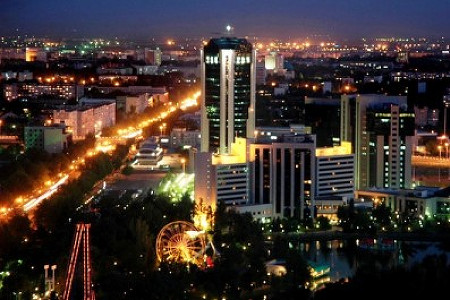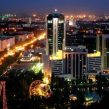
Uzbekistan’s Economic Situation in 2013: Growth vs. Clan Interests
Publication: Eurasia Daily Monitor Volume: 11 Issue: 8
By:

As 2013 came to an end, the economy of Uzbekistan reportedly finished strong. Industrial manufacturing output and exports saw a boost. Moreover, the Oliy Majlis, the parliament of Uzbekistan, approved a program to create nearly a million places of work in 2014. In his Constitution Day speech, the president of Uzbekistan—Islam Karimov—talked about the country’s economic achievements of 2013 and gave a rare tally of the increased number of cars, refrigerators, televisions, and cell phones each household in the country now owns. However, with recent revelations by President Karimov’s elder daughter, Gulnara Karimova, about the alleged schemes that the National Security Service (SNB) and other interest clans employ to control the economy of the country, this economic boom may have limited relevance to ordinary citizens. While Gulnara Karimova’s revelations did not come as a surprise—to own and secure a successful business in Uzbekistan, one has to somehow be connected to the higher echelons of government—the details she revealed have been unprecedented. Even though she herself is connected to the government and still resides in the country, Karimova identified high-level individuals, the names of their money-laundering businesses as well as the banks involved.
Uzbekistan’s official economic indicators for the past year have been quite positive. The State Budget Committee’s review for the last nine months of 2013 reported that, along with an 8.1-percent increase in GDP (the International Monetary Fund had estimated 7 percent), the growth in construction in Uzbekistan constituted 19.2 percent, industrial production—9.4 percent, and agricultural products—6.8 percent. Mechanical engineering and the metal-working industry, consumer goods manufacturing, construction materials as well as the food industry grew the fastest, and their share in the country’s GDP increased from 47.4 percent to 51.4 percent compared to 2012, the report continued. Two thousand two hundred manufacturing entities introduced in 2013 contributed to the increase, the report added (https://www.mezon.uz/news-in-uzbekistan/politika/15139-deputaty-rassmotreli-otchet-ob-ispolnenii-gosudarstvennogo-byudzheta-respubliki-uzbekistan-za-9-mesyatsev). Predicting the continuation of investment programs and stable economic growth, the Oliy Majlis approved a government program to create 983,600 jobs mainly for young people, women, the disabled and other vulnerable members of the population in 2014. The state-sponsored job program will include the introduction of new industrial facilities as well as the modernization of existing ones; the development of small businesses; an expansion of services, communications and housing construction; the enhancement of work-from-home businesses; and restoration of inactive enterprises (https://uza.uz/ru/politics/26173/).
According to a recent report, along with building schools, medical facilities, and other infrastructure, 11,000 houses will be built in rural areas in 2014 by a presidential decree, up from 10,000 planned in 2013 (https://www.uzdaily.uz/articles-id-18101.htm). This $2.2 billion program of rural housing construction has contributed to erecting an average of 6,000 houses per year since 2009 and will end in 2015 (https://www.trend.az/regions/casia/uzbekistan/2213345.html).
The State Budget Committee’s review also added that the country had a positive trade balance in 2013, with a boost in exports and expansion to new foreign markets. The prime minister of Uzbekistan, Shavkat Mirziyayev, predicted even higher volumes of exports for his country in 2014 and beyond. While chairing the November 2013 meeting in Tashkent of the Council of Heads of Government of the Shanghai Cooperation Organization (SCO) member states, Mirziyayev urged the SCO members to sign, as soon as possible, an agreement on creating favorable conditions for international road transport across the borders of the SCO—the agreement had been awaiting signature for ten years already, Uzbekistan’s prime minister noted (https://www.1prime.ru/transport/20131129/771807396.html; https://www.uzdaily.uz/articles-id-18257.htm). That same month, during a visit from Turkmenistan’s President Gurbanguly Berdimuhamedov to Tashkent, the parties indicated the importance and strategic character of implementing an “Uzbekistan-Turkmenistan-Iran-Oman” transportation corridor—a visible sign that Uzbekistan is actively seeking access options to international markets (https://www.trend.az/regions/casia/uzbekistan/2214901.html).
On December 8, while delivering his annual Constitution Day speech, President Karimov gave unusually specific statistics to indicate the improved quality of life of Uzbekistan’s population. In particular, he noted that every third family in Uzbekistan has a car; for every 100 families, there are 80 refrigerators and 146 TV units; Uzbekistan’s population boasts three cell phones per family; and the number of internet service users has increased this past year by 18.3 percent to a total 7.1 million subscribers (press-service.uz, December 6, 2013). Moreover, a recent announcement that about 77 new recreational parks will be built and old ones renovated in 2014 shows that the government is working on recreational and leisure issues along with economic issues (https://www.vesti.uz/index.php?option=com_content&view=article&id=40799).
Recent candid descriptions of the hidden side of the Uzbekistani economy, however, raise the question of whether all these above-mentioned growth indicators provide an accurate picture of the country’s economic climate. Notably, in a December interview with the British paper The Guardian, President Karimov’s daughter Gulnara revealed the extent to which trade and transit in Uzbekistan is controlled by the SNB and people close to this state security service. Moreover, she asserted that businesses are always in danger of seizure and racketeering practices (The Telegraph, December 23, 2013/; https://qoplonbek.wordpress.com/2013/12/26/gulnara-karimova-uzbekistans-first-daughter-speaks-out-about-her-country-and-ongoing-family-feud/). Clans in Uzbekistan collaborate closely, according to her, to divide domestic businesses among themselves. If state construction tenders are controlled by the clan of Salimov (probably here referring to Salim Abduvaliev—one of the richest people in Uzbekistan who left the country in the fall of 2013), Shavkat Mirziyayev (current prime minister) and Alisher Usmanov (Uzbekistan-born Russian tycoon), then the Sharifhodjaevs clan (headed by Hayot and Djavdat Sharifhodjaev—the former serves as a deputy to SNB head Rustam Inoyatov) controls the cotton transit business, she claims. Karimova’s interview provides further details on the names of the money-laundering companies the SNB holds, the financial institutions with their stakes, as well as the names of the banks where they hold accounts.
The International Monitory Fund predicts Uzbekistan’s GDP will grow in 2014 by 6.5 percent; the Asian Development Bank predicts 8-percent growth; and official government forecasts put next year’s economic expansion at 8.1 percent (https://www.uzdaily.uz/articles-id-17467.htm.) The government, in particular, predicts a boost in capital investment by 9.5 percent, industrial production by 8.3 percent, and agricultural production by 6 percent (https://www.uzdaily.uz/articles-id-17928.htm). Thus, whether by 6.5 or 8.1 percent, Uzbekistan’s economy is set to grow. Yet, as revelations by Gulnara Karimova underscore, were it not for the alleged clannish control of the country’s $55 billion economy, Uzbekistan’s growth this year would likely be even greater.




